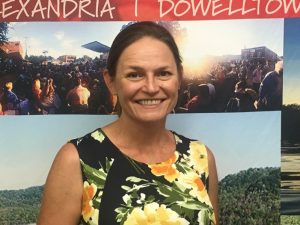August 1, 2020
By: Dwayne Page
If you’re a census slacker and haven’t yet filled out the form for the 2020 head count, expect a knock on your door soon from a representative of the US Census Bureau.
The current DeKalb County self response rate to the census is at 50.3% which is approximately 12% below the Tennessee average. Self response rates for the cities are as follows: Liberty-49.2%, Alexandria 55.2%, Smithville 57.4%, and Dowelltown 57. 4%. The final county wide response rate for 2010 was 62.3%.
“Beginning August 11 we will have census takers out knocking on the doors of those who haven’t yet responded to collect their information. In some cases they (census takers) may just leave a request to respond behind at the home and in other cases a masked census taker will collect your responses from a safe distance. They will be carrying a tablet or cell phone to enter the information into our website the same as you would do yourself,” said June Illjana, Partnership Media Specialist of the US Census Bureau in an interview on WJLE Friday afternoon.
“We sent out the first invitations to respond to the census in mid March and initially people responded pretty quickly but as of right now only about half the households in DeKalb County have responded to the census. We are at 50.3% here so we really need to encourage the other half of the households to respond as quickly as possible because we are running out of time. We do know based on 911 system and U.S. Postal Service records how many residences there are in a community but what we don’t know is how many people live in those homes and that is critically important,” said Illjana.
The U.S. Census Bureau has also announced that it will begin emailing households in low-responding areas to encourage them to respond to the 2020 Census. The email messages will invite people to respond online at 2020census.gov. People who receive the email and haven’t already responded should click on the link provided and complete the census online. It’s easy, safe and important.
“Responding online is quick and easy. We only ask a few simple questions. We ask for the names and birth dates of everyone living in the home. We ask for their race which is used for voting district boundaries, and we ask the respondent’s relationship to the householder. If you don’t have Internet access or you are not comfortable in that environment you may phone the Census Bureau and answer the questions. That number is 1-844-330-2020,” Illjana continued.
Census takers will wear masks and follow local public health guidelines when they visit your home. All census takers complete a virtual COVID-19 training on social distancing and other health and safety protocols before beginning their work in neighborhoods.
If the census taker who visits your home does not speak your language, you may request a return visit from a census taker who does speak your language.
If no one is home when the census taker visits, the census taker will leave a notice of their visit with information about how to respond online, by phone or by mail.
If someone visits your home this year to collect information for the 2020 Census, check to make sure they have a valid ID badge with their photograph, a U.S. Department of Commerce watermark, and an expiration date. Census workers may also carry Census Bureau bags and other equipment with the Census Bureau logo.
If you still have questions about their identity, you can contact your regional census center to speak with a Census Bureau representative.
During the 2020 Census, the Census Bureau will never ask you for: Your Social Security number, Money or donations, Anything on behalf of a political party, Your bank or credit card account numbers. Additionally, there is no citizenship question on the 2020 Census.
If someone claiming to be from the Census Bureau contacts you via email or phone and asks you for one of these things, it’s a scam, and you should not cooperate. For more information, visit Avoiding Fraud and Scams.
Your personal information is kept confidential. The Census Bureau is bound by federal law to protect your information, and your data is used only for statistical purposes.
Your responses are compiled with information from other homes to produce statistics, which never identify your home or any person in your home
The 2020 Census will provide a snapshot of our nation—who we are, where we live, and so much more.
The results of this once-a-decade count determine the number of seats each state has in the House of Representatives. They are also used to draw congressional and state legislative districts.
Over the next decade, lawmakers, business owners, and many others will use 2020 Census data to make critical decisions. The results will show where communities need new schools, new clinics, new roads, and more services for families, older adults, and children.
The results will also inform how hundreds of billions of dollars in federal funding are allocated to more than 100 programs, including Medicaid, Head Start, block grants for community mental health services, and the Supplemental Nutrition Assistance Program, also known as SNAP.
“In the U.S. Constitution, the census data or number of people living in a community is used to reallocate federal tax dollars back to those communities based on their population. A complete census count affects how much money the state of Tennessee and DeKalb County get each year for the next ten years to support things like roads, schools, healthcare, Medicare, nutrition programs, school lunches, and all kinds of things that affect everyone everyday,” said Illjana.
Households have until October 31 to respond to the 2020 Census.




